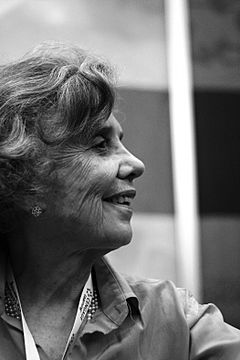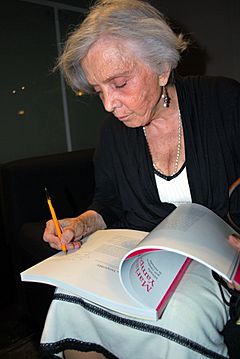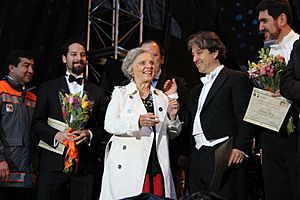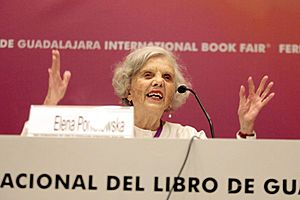Elena Poniatowska facts for kids
Quick facts for kids
Elena Poniatowska
|
|
|---|---|
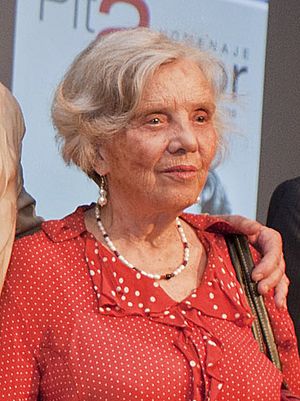
Poniatowska in 2015.
|
|
| Born |
Hélène Elizabeth Louise Amélie Paula Dolores Poniatowska Amor
May 19, 1932 |
| Occupation | Journalist, author |
| Spouse(s) | Guillermo Haro (deceased) |
| Children | Emmanuel Haro Poniatowski (1955) Felipe Haro Poniatowski (1968) Paula Haro Poniatowska (1970) |
| Awards | Miguel de Cervantes Prize 2013 |
Elena Poniatowska is a famous Mexican journalist and author who was born in France. Her full birth name is Hélène Elizabeth Louise Amélie Paula Dolores Poniatowska Amor. She is known for writing about social and political problems, especially those affecting women and people in poverty.
Poniatowska was born in Paris on May 19, 1932, to a wealthy family. Her mother's family had left Mexico during the Mexican Revolution. When Elena was ten, her family moved to Mexico to escape World War II.
At age 18, she started working for the newspaper Excélsior, where she wrote interviews and articles about society. Even though there were fewer opportunities for women in the 1950s, she wrote powerful stories about important issues. Her most famous book is La noche de Tlatelolco (Massacre in Mexico), which tells the story of the 1968 student protests in Mexico City. Because of her political views, some people call her "the Red Princess." She is considered one of Mexico's greatest writers and is still active today.
Contents
Early Life and Family
Elena Poniatowska was born in Paris, France. Her father, Prince Jean Joseph Évremond Sperry Poniatowski, came from a noble Polish family. Her mother, María Dolores Paulette Amor de Yturbe, was from a Mexican family that had lost its land during the Mexican Revolution.
Her family tree includes many interesting people, like an archbishop, a musician, and even the American statesman Benjamin Franklin. Her aunt, Pita Amor, was also a famous poet.
Moving to Mexico
When Elena was a child, World War II began. Her family left Paris and moved to the south of France. When the war got worse, her mother took Elena and her siblings to Mexico. Elena was ten years old. Her father stayed in France to fight in the war.
In Mexico, Elena learned Spanish from her nanny and from people on the street, as her family spoke French at home. She went to school at the Liceo Franco-Mexicano and later attended schools in the United States. When she returned to Mexico, she learned to type and began her career as a journalist instead of going to a university.
Personal Life
In 1959, Elena interviewed the astronomer Guillermo Haro, and they married in 1968. They had three children: Emmanuel, Felipe, and Paula. The couple later divorced in 1981.
Today, Poniatowska lives in a house in Mexico City filled with books and art. She continues to write from her home.
A Career in Writing
Elena Poniatowska has had a long and successful career as a writer. She has published novels, non-fiction books, and many articles. Her work often focuses on social justice and human rights.
Starting as a Journalist
She began her career in 1953 at the newspaper Excélsior. At first, she wrote interviews with famous people and articles about high society. She said she started "like a donkey," knowing nothing and learning as she went.
Over time, she began to write about more serious social and political topics. She became a strong female voice in a time when men dominated journalism. She gained respect through her hard work and persistence.
Telling People's Stories
Poniatowska is famous for her "testimonial narratives." These are books based on historical facts and the real-life stories of ordinary people whose voices are not often heard.
She started writing this way after visiting a prison to interview striking railway workers. She found that the prisoners were eager to share their stories. This led to some of her most important work, including her book about the 1968 Tlatelolco student massacre.
She is also one of the founders of the newspaper La Jornada and the feminist magazine Fem.
Writing Style and Advocacy
Poniatowska's writing is a mix of storytelling and history. She supports people who are treated unfairly by those in power. She is not a neutral writer; she acts as a voice for those who cannot speak for themselves.
She believes it is important to have a personal connection with the people she writes about. The 1968 student movement deeply affected her and made her realize that her writing could be a tool for change in Mexico.
She has supported many causes, including those of farmers, workers, and indigenous groups like the Zapatistas in the 1990s. She has also been involved in politics, supporting the presidential campaign of Andrés Manuel López Obrador.
Major Works
Poniatowska has written many important books that document key moments in Mexican history.
- La noche de Tlatelolco (Massacre in Mexico, 1971): This is her most famous book. It tells the story of the 1968 student protests in Mexico City, where many students were killed by government forces. She interviewed witnesses and survivors to create a powerful account that challenged the government's official story. She refused to accept an award for this book from the president at the time.
- Nada, nadie. Las voces del temblor (Nothing, Nobody: The Voices of the Earthquake, 1988): After the huge 1985 Mexico City earthquake, she collected the stories of survivors. The book showed not only the tragedy of the earthquake but also the government's poor response.
- Hasta no verte Jesús mío (Here's to You, Jesusa, 1969): This novel tells the story of a poor woman who fought in the Mexican Revolution. It is based on ten years of interviews and is considered a classic of testimonial literature.
- Tinísima (1991): This is a novel based on the life of Tina Modotti, an Italian photographer and political activist. Poniatowska spent ten years researching for this book.
Awards and Recognition
Elena Poniatowska has received many awards for her work.
- She won the Mazatlán Literature Prize twice, in 1971 and 1992.
- In 1978, she was the first woman to win Mexico's National Journalism Prize.
- In 2001, she won the Alfaguara Novel Prize for her book La piel del cielo (The Skin of the Sky).
- In 2006, the International Women's Media Foundation gave her a Lifetime Achievement Award.
- In 2013, she won the Miguel de Cervantes Prize, the most important literary award in the Spanish-speaking world.
- In 2023, she received the Belisario Domínguez Medal of Honor, the highest award given to a civilian by the Senate of Mexico.
She has also received honorary doctorate degrees from many universities, including the National Autonomous University of Mexico (UNAM).
List of Selected Works
Here are some of Elena Poniatowska's many books:
- 1954 – Lilus Kikus (short stories)
- 1969 – Hasta no verte, Jesus mío (novel)
- 1971 – La noche de Tlatelolco: Testimonios de historia oral (historical account)
- 1978 – Querido Diego, te abraza Quiela (fictional letters)
- 1988 – Nada, nadie. Las voces del temblor (historical account)
- 1991 – Tinísima (novel)
- 1999 – Las soldaderas (photographs and stories of women in the Mexican Revolution)
- 2001 – La piel del cielo (novel)
- 2006 – El tren pasa pimero (novel)
- 2011 – Leonora (novel about the artist Leonora Carrington)
See also
 In Spanish: Elena Poniatowska para niños
In Spanish: Elena Poniatowska para niños
 | Bayard Rustin |
 | Jeannette Carter |
 | Jeremiah A. Brown |


